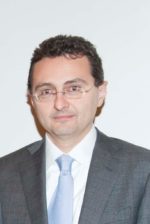“TESLA is a unique opportunity for European countries to push ‘microwave technologies’ for near-future satellite applications in a collaborative framework. This will take place through the training of engineers in key and relevant research areas within top-level premises and world-wide known academic institutions.”
Prof. Vincente Boria

Vicente E. Boria Esbertwas born in Valencia, Spain, on May 18, 1970. He received the Diploma degree (5-year studies) and the Ph.D. degree, both on “Telecommunication Engineering” from Technical University of Valencia (Universitat Politècnica de València, UPV) in 1993 and 1997, respectively. n 1993 he joined the “Communications Department” of UPV, where he is currently (and since Oct. 2003) Full Professor. He established in 1997 a new R&D Group on Microwave Applications (which was one of the founding members of the well-known R&D Institute on Telecommunications & Multimedia Applications -iTEAM- of UPV).
In 1993 he joined the “Communications Department” of UPV, where he is currently (and since Oct. 2003) Full Professor. He established in 1997 a new R&D Group on Microwave Applications (which was one of the founding members of the well-known R&D Institute on Telecommunications & Multimedia Applications -iTEAM- of UPV). In 1995 and 1996, he was holding a Spanish Trainee position with the European Space Research and Technology Centre, European Space Agency (ESTEC-ESA), Noordwijk, The Netherlands; where he was well trained in his main research lines, which are presently focused on the full-wave analysis and automated design of high-frequency equipment (passive microwave circuits), and on modelling and experimental validation of high-power effects for satellite applications (i.e. multipactor, corona and passive inter-modulation -PIM-).
In these topics he has published 10 chapters in technical textbooks (with publishers as Wiley), 180 papers in refereed international technical journals with high impact-factor (mostly edited by the renowned Institute of Electrical and Electronics Engineers, IEEE), and over 200 articles in well-known international conference proceedings. Up to now, these publications have received a total number of 3450 cites providing, respectively, h-index and i10-index values of 27 and 114. Thanks to these records, he has been recently elevated (in 2018) to the highest grade of IEEE Fellow member by nomination of the Microwave Theory and Techniques Society (IEEE MTT-S).
During the last 24 successful years of outstanding research activity, Prof. Boria has supervised 18 Ph.D. dissertations, has been actively involved in 40 R&D competitive projects (heading 20 of them), and has been the main researcher of 15 contracts (technology transfer activities) with private funding from international organizations (ESA) and relevant space companies (Thales Alenia Space), being also co-inventor of 6 active patents. He has also received a Research Prize from UPV Social Council for his significant scientific achievements, as well as the Prize to the Engineer of the Year (2016) from Professional Association of Telecommunication Engineers (Valencia).
In 2006, he co-funded the spin-off company Aurora Software and Testing S.L., where he has been Scientific Advisor until 2016 (when the company was acquired by the multi-national firms CST Computer Simulation Technology AG -Germany- and Dassault Systems -France-). In 2010, Prof. Boria led the creation of Valencia Space Consortium (VSC), a public body where he is the President of its Executive Commission, and he runs -together with ESA-, the European High-Power Radiofrequency Laboratory (located within the UPV campus).
Presently, Prof. Boria is reviewer of main technical journals on microwaves, and he is member of Technical Committees of most relevant international conferences (IEEE-MTT International Microwave Symposium and European Microwave Conference). He has been Associate Editor of IEEE Microwave & Wireless Components Letters (2013-2018) and of IET Electronics Letters (2015-2018), and he presently serves as Subject Editor (Microwaves) of IET Electronics Letters since 2018.
For more information on Prof. Borias research group see the GAM homepage
